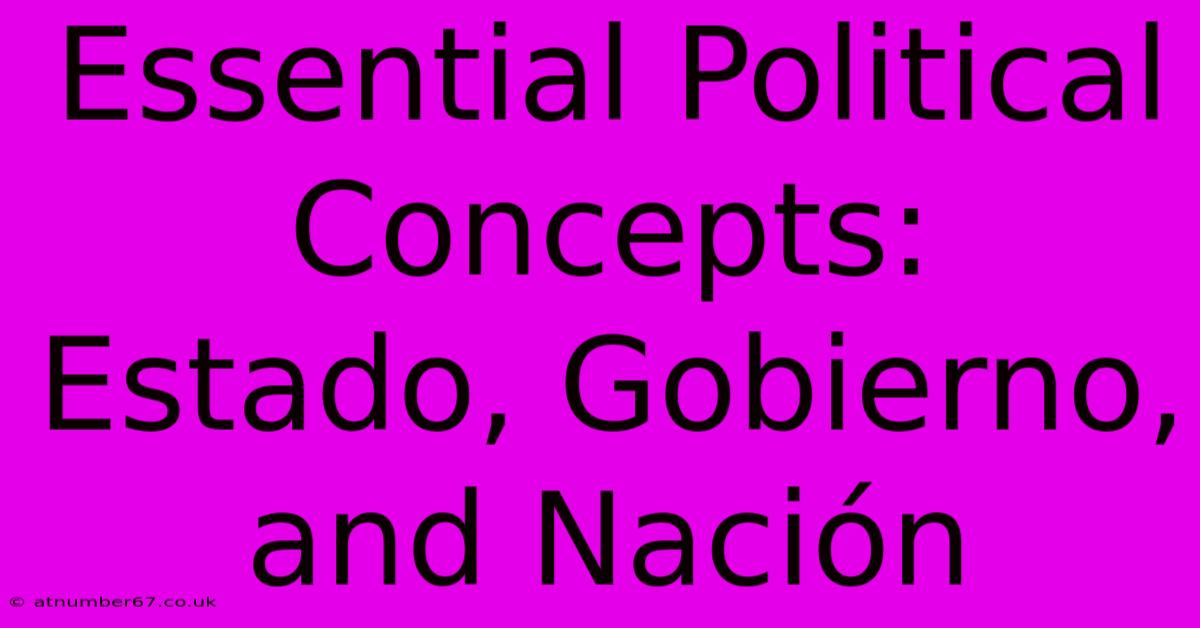Essential Political Concepts: Estado, Gobierno, And Nación

Table of Contents
Essential Political Concepts: Estado, Gobierno, and Nación
Understanding the nuances of political discourse requires grasping fundamental concepts. While often used interchangeably, the terms Estado, Gobierno, and Nación represent distinct yet interconnected elements of a political system. This article will delve into the meaning and differences between these three crucial concepts, clarifying their roles and relationships.
What is the Estado? (The State)
The Estado, often translated as "the State," refers to the permanent, institutional structure of political power within a defined territory. It encompasses the entire apparatus of government, including its legislative, executive, and judicial branches, as well as its bureaucracy and security forces. The Estado is characterized by its:
- Sovereignty: The State possesses supreme authority within its borders, free from external interference.
- Monopoly on legitimate force: The State holds the exclusive right to use force legitimately, maintaining order and enforcing laws.
- Legitimacy: The State's authority is generally accepted by its citizens, although this can vary depending on factors such as political stability and public trust.
- Territory: The Estado exercises its power within clearly defined geographical boundaries.
- Population: The State governs a specific population residing within its territory.
Think of the Estado as the entire machine – the physical structure, the rules, and the people that make it run. It's the enduring entity that persists even through changes in government.
What is the Gobierno? (The Government)
The Gobierno, or "government," refers to the group of people who currently exercise political power within the State. It is the acting authority responsible for implementing the laws and policies of the State. The Gobierno:
- Is temporary: Governments are formed and dissolved through elections, coups, or other political processes. The Estado remains, but the Gobierno changes.
- Executes the laws: The primary role of the Gobierno is to implement and enforce the laws passed by the legislature.
- Leads the State's administration: It manages the day-to-day affairs of the State, including budgeting, public services, and foreign policy.
- Represents the State: The Gobierno acts as the face of the State in its interactions with other countries and international organizations.
The Gobierno is like the current management team of the machine – they run the operations, but the machine itself continues to exist regardless of who is in charge.
What is the Nación? (The Nation)
The Nación, or "nation," refers to a group of people united by shared characteristics, such as culture, language, history, or ethnicity. Unlike the Estado, which is defined by territory and institutions, the Nación is defined by its collective identity. The Nación:
- Can exist without a State: Nations can exist without having their own State, as seen in numerous instances of stateless nations throughout history.
- Is a concept of belonging: It fosters a sense of shared identity and community among its members.
- Can be a source of political mobilization: National identity can be a powerful force in shaping political movements and struggles for self-determination.
- Often influences the Estado: A nation's identity and aspirations can profoundly impact the policies and actions of the State.
The Nación is like the people who give the machine meaning and purpose – their shared identity drives the state's direction and aspirations.
The Interplay of Estado, Gobierno, and Nación
These three concepts are intricately linked. The Estado provides the framework, the Gobierno manages its operations, and the Nación provides the sense of identity and purpose that shapes both. However, the relationship between them isn't always harmonious. Conflicts can arise when the Gobierno doesn't represent the interests of the Nación, or when the Estado's boundaries don't align with the nation's perceived territory. Understanding these distinctions is crucial to navigating the complexities of political systems and international relations.
Conclusion: A Crucial Distinction
By understanding the differences between the Estado, Gobierno, and Nación, we gain a more nuanced understanding of how political systems function. This knowledge is essential for critically analyzing political events, understanding the dynamics of power, and engaging in informed political discourse. The interplay of these three concepts is fundamental to comprehending the complexities of nation-states and their role in the global landscape.

Thank you for visiting our website wich cover about Essential Political Concepts: Estado, Gobierno, And Nación. We hope the information provided has been useful to you. Feel free to contact us if you have any questions or need further assistance. See you next time and dont miss to bookmark.
Featured Posts
-
Sanjay Bangars Son A Young Mans Ambitions
Apr 04, 2025
-
Saif Ali Khans Sons A Fathers Pride And Joy
Apr 04, 2025
-
Ravindra Jadejas Age The Cricketers Secret Weapon
Apr 04, 2025
-
Dad N Me Game Fun For All Ages
Apr 04, 2025
-
Kaka Son Achieve More Do Less
Apr 04, 2025
